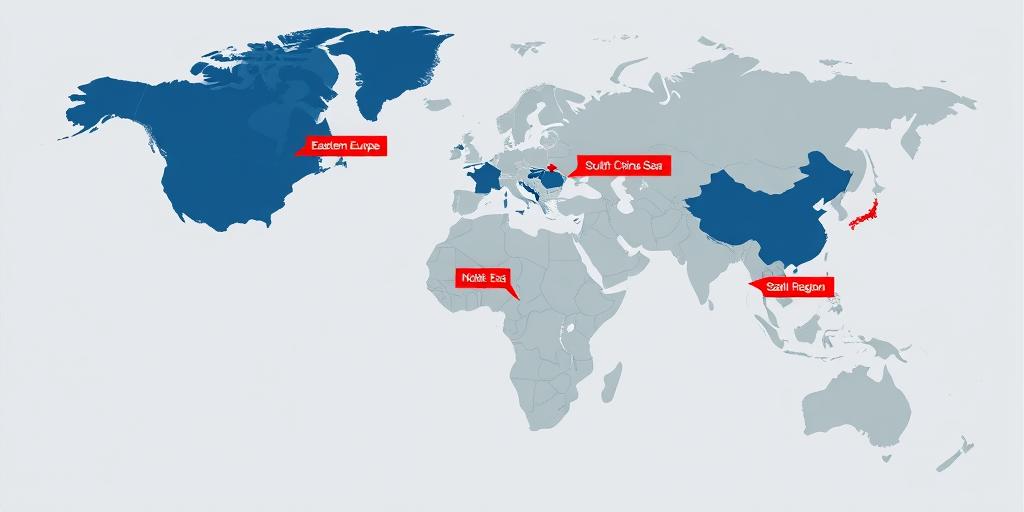Geopolitical hotspots are regions around the world where political tensions are high and conflict is likely. These areas often involve complex historical, economic, and social factors that contribute to instability. Monitoring these hotspots is crucial for understanding global dynamics and potential impacts on international relations, trade, and security.
Key Geopolitical Hotspots to Watch:
Eastern Europe (Ukraine and Russia): The ongoing conflict between Ukraine and Russia remains a critical concern. Factors include Russia's annexation of Crimea, the war in Donbas, and NATO's eastward expansion. The situation is exacerbated by energy politics, disinformation campaigns, and the involvement of external actors.
The South China Sea: This region is contested by multiple countries, including China, Vietnam, the Philippines, Malaysia, and Brunei. Disputes over maritime boundaries, islands, and resources have led to increased military presence and diplomatic tensions. China's assertive actions and construction of artificial islands have heightened the risk of confrontation.
The Korean Peninsula: The Democratic People's Republic of Korea's (DPRK) nuclear and missile programs continue to pose a significant threat to regional and international security. Despite diplomatic efforts, tensions remain high due to ongoing sanctions, military exercises, and the unpredictable nature of the DPRK regime.
The Middle East (Israel, Palestine, Iran, and Yemen): The Middle East is a complex and volatile region characterized by sectarian conflicts, political rivalries, and external intervention. The Israeli-Palestinian conflict, Iran's nuclear ambitions, and the civil war in Yemen contribute to ongoing instability. The involvement of regional and global powers further complicates the situation.
The Sahel Region (Mali, Burkina Faso, and Niger): The Sahel region faces numerous challenges, including political instability, terrorism, and climate change. The presence of extremist groups, such as al-Qaeda and ISIS, has led to increased violence and displacement. Climate change exacerbates resource scarcity and inter-communal tensions.
Factors Contributing to Geopolitical Tensions:
- Resource Competition: Competition for resources, such as oil, gas, and water, can exacerbate tensions between countries. Control over strategic resources is often a key factor in geopolitical calculations.
- Ideological Differences: Conflicting ideologies, such as democracy versus authoritarianism, can fuel geopolitical rivalries. These differences often manifest in proxy conflicts and information warfare.
- Territorial Disputes: Disagreements over territorial boundaries and sovereignty remain a major source of conflict. These disputes can trigger military clashes and undermine regional stability.
- External Interference: The involvement of external actors, such as major powers and international organizations, can either mitigate or exacerbate geopolitical tensions. Strategic alliances and interventions often have unintended consequences.
Implications for Global Stability:
Monitoring geopolitical hotspots is essential for anticipating and managing potential crises. Instability in these regions can have far-reaching consequences, including:
- Economic Disruptions: Conflicts can disrupt trade, investment, and supply chains, leading to economic instability.
- Humanitarian Crises: Wars and political violence can result in displacement, loss of life, and human rights abuses.
- Refugee Flows: Conflicts often generate large-scale refugee flows, placing strain on neighboring countries and international aid organizations.
- Security Threats: Unresolved conflicts can create opportunities for terrorist groups and other non-state actors to operate, posing a threat to regional and international security.
Conclusion:
Geopolitical hotspots are dynamic and complex areas that require careful monitoring and analysis. Understanding the underlying factors and potential consequences of these tensions is crucial for promoting global stability and preventing future conflicts. By staying informed and engaged, policymakers, researchers, and concerned citizens can contribute to a more peaceful and prosperous world.









